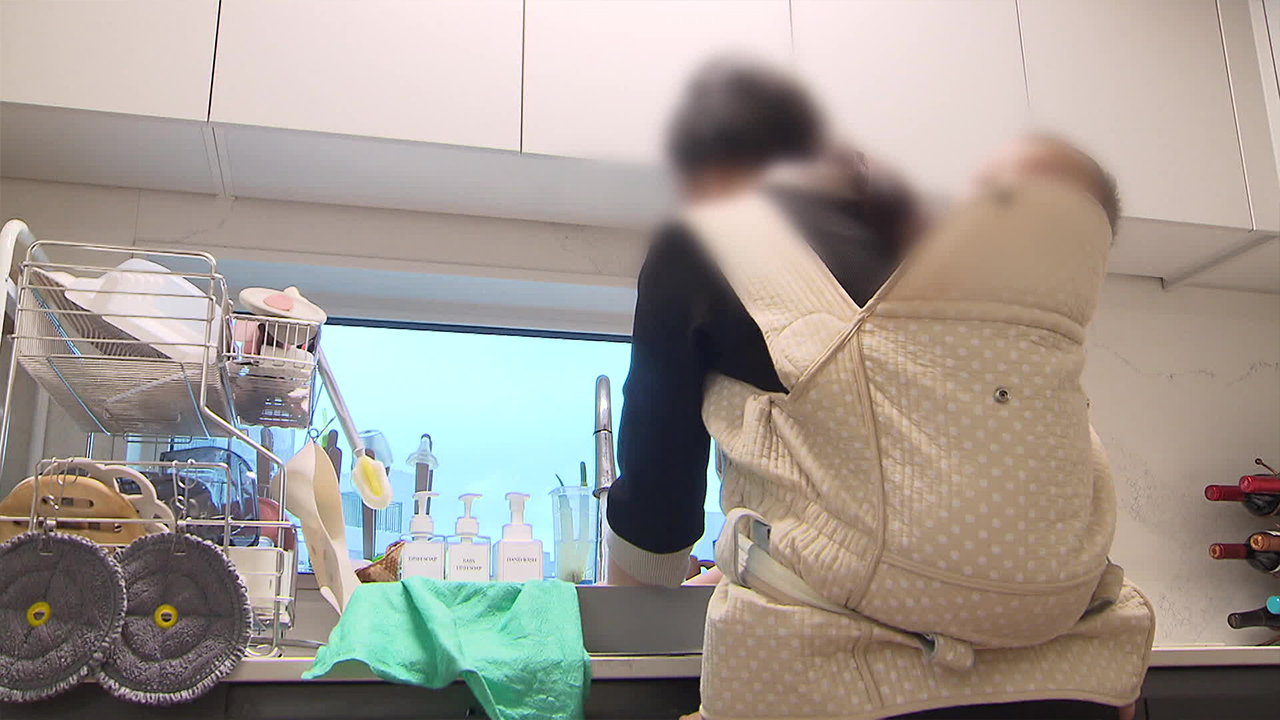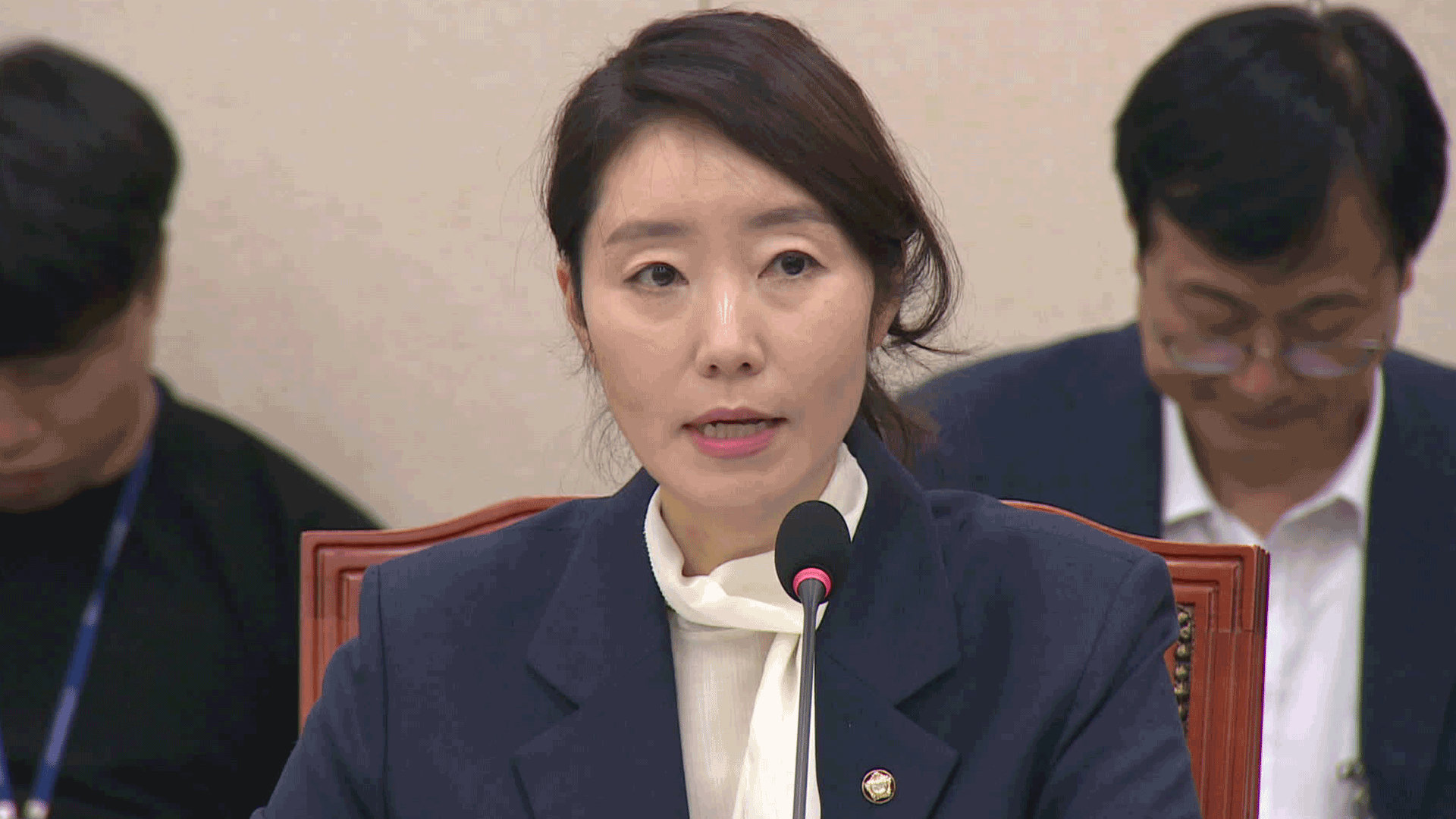[Anchor]
Research results show that the average daily housework time for husbands is 21 minutes, which is more than seven times less than that of their wives.
According to the study, significantly increasing husbands' participation in housework can help prevent depression in wives.
This is a report by medical correspondent Park Kwang-sik.
[Report]
Lee Jong-seok, who has been married for 15 years, organizes laundry at home after work.
Despite a busy daily life, he is gradually increasing his share of housework for his wife.
[Lee Jong-seok/Husband/15 years of marriage: "On weekdays, I help wash the dishes after dinner. On weekends, I prepare breakfast."]
[Ryu Jin-young/Wife/15 years of marriage: "I'm really grateful when he does things on his own. It makes me feel like 'we are really a family and a community, and we are doing these things together,' which makes me very happy."]
A study by Yonsei University College of Medicine, tracking over 7,000 married women nationwide for nine years, revealed that the average daily housework time was 2 hours and 37 minutes.
In contrast, husbands only contributed 21 minutes, resulting in a staggering difference of more than seven times.
The disproportionate burden of housework on women can lead to depression.
In fact, it was found that for every additional hour of housework participation by husbands, the risk of depression in wives decreased by 12%.
Especially when wives feel satisfied with their husbands' participation in housework, the preventive effect against depression was even greater.
[Baek Seong-woon/Researcher, Yonsei University College of Medicine, Industrial Health Research Institute: "Even if the husband participates for one hour, whether the wife is actually satisfied or dissatisfied is also related to the occurrence of depression."]
Active participation by husbands in housework helps balance work and family life and improves the couple's relationship.
However, despite this being widely known, there are challenges in practice.
[Yoon Jin-ha/Professor, Yonsei University School of Medicine, Department of Preventive Medicine: "Even after work, if the husband continues to worry about work when he comes home and there is no sense of shared responsibility in housework, it can significantly impact the wife's depression."]
Experts point out that to improve the division of housework requires both institutional support such as expanded parental leave and flexible work systems, and a shift in social awareness to establish equal gender norms at home.
This is KBS News, Park Kwang-sik.
Research results show that the average daily housework time for husbands is 21 minutes, which is more than seven times less than that of their wives.
According to the study, significantly increasing husbands' participation in housework can help prevent depression in wives.
This is a report by medical correspondent Park Kwang-sik.
[Report]
Lee Jong-seok, who has been married for 15 years, organizes laundry at home after work.
Despite a busy daily life, he is gradually increasing his share of housework for his wife.
[Lee Jong-seok/Husband/15 years of marriage: "On weekdays, I help wash the dishes after dinner. On weekends, I prepare breakfast."]
[Ryu Jin-young/Wife/15 years of marriage: "I'm really grateful when he does things on his own. It makes me feel like 'we are really a family and a community, and we are doing these things together,' which makes me very happy."]
A study by Yonsei University College of Medicine, tracking over 7,000 married women nationwide for nine years, revealed that the average daily housework time was 2 hours and 37 minutes.
In contrast, husbands only contributed 21 minutes, resulting in a staggering difference of more than seven times.
The disproportionate burden of housework on women can lead to depression.
In fact, it was found that for every additional hour of housework participation by husbands, the risk of depression in wives decreased by 12%.
Especially when wives feel satisfied with their husbands' participation in housework, the preventive effect against depression was even greater.
[Baek Seong-woon/Researcher, Yonsei University College of Medicine, Industrial Health Research Institute: "Even if the husband participates for one hour, whether the wife is actually satisfied or dissatisfied is also related to the occurrence of depression."]
Active participation by husbands in housework helps balance work and family life and improves the couple's relationship.
However, despite this being widely known, there are challenges in practice.
[Yoon Jin-ha/Professor, Yonsei University School of Medicine, Department of Preventive Medicine: "Even after work, if the husband continues to worry about work when he comes home and there is no sense of shared responsibility in housework, it can significantly impact the wife's depression."]
Experts point out that to improve the division of housework requires both institutional support such as expanded parental leave and flexible work systems, and a shift in social awareness to establish equal gender norms at home.
This is KBS News, Park Kwang-sik.
■ 제보하기
▷ 카카오톡 : 'KBS제보' 검색, 채널 추가
▷ 전화 : 02-781-1234, 4444
▷ 이메일 : kbs1234@kbs.co.kr
▷ 유튜브, 네이버, 카카오에서도 KBS뉴스를 구독해주세요!
- Husband's role in housework
-
- 입력 2025-01-31 01:06:34

[Anchor]
Research results show that the average daily housework time for husbands is 21 minutes, which is more than seven times less than that of their wives.
According to the study, significantly increasing husbands' participation in housework can help prevent depression in wives.
This is a report by medical correspondent Park Kwang-sik.
[Report]
Lee Jong-seok, who has been married for 15 years, organizes laundry at home after work.
Despite a busy daily life, he is gradually increasing his share of housework for his wife.
[Lee Jong-seok/Husband/15 years of marriage: "On weekdays, I help wash the dishes after dinner. On weekends, I prepare breakfast."]
[Ryu Jin-young/Wife/15 years of marriage: "I'm really grateful when he does things on his own. It makes me feel like 'we are really a family and a community, and we are doing these things together,' which makes me very happy."]
A study by Yonsei University College of Medicine, tracking over 7,000 married women nationwide for nine years, revealed that the average daily housework time was 2 hours and 37 minutes.
In contrast, husbands only contributed 21 minutes, resulting in a staggering difference of more than seven times.
The disproportionate burden of housework on women can lead to depression.
In fact, it was found that for every additional hour of housework participation by husbands, the risk of depression in wives decreased by 12%.
Especially when wives feel satisfied with their husbands' participation in housework, the preventive effect against depression was even greater.
[Baek Seong-woon/Researcher, Yonsei University College of Medicine, Industrial Health Research Institute: "Even if the husband participates for one hour, whether the wife is actually satisfied or dissatisfied is also related to the occurrence of depression."]
Active participation by husbands in housework helps balance work and family life and improves the couple's relationship.
However, despite this being widely known, there are challenges in practice.
[Yoon Jin-ha/Professor, Yonsei University School of Medicine, Department of Preventive Medicine: "Even after work, if the husband continues to worry about work when he comes home and there is no sense of shared responsibility in housework, it can significantly impact the wife's depression."]
Experts point out that to improve the division of housework requires both institutional support such as expanded parental leave and flexible work systems, and a shift in social awareness to establish equal gender norms at home.
This is KBS News, Park Kwang-sik.
Research results show that the average daily housework time for husbands is 21 minutes, which is more than seven times less than that of their wives.
According to the study, significantly increasing husbands' participation in housework can help prevent depression in wives.
This is a report by medical correspondent Park Kwang-sik.
[Report]
Lee Jong-seok, who has been married for 15 years, organizes laundry at home after work.
Despite a busy daily life, he is gradually increasing his share of housework for his wife.
[Lee Jong-seok/Husband/15 years of marriage: "On weekdays, I help wash the dishes after dinner. On weekends, I prepare breakfast."]
[Ryu Jin-young/Wife/15 years of marriage: "I'm really grateful when he does things on his own. It makes me feel like 'we are really a family and a community, and we are doing these things together,' which makes me very happy."]
A study by Yonsei University College of Medicine, tracking over 7,000 married women nationwide for nine years, revealed that the average daily housework time was 2 hours and 37 minutes.
In contrast, husbands only contributed 21 minutes, resulting in a staggering difference of more than seven times.
The disproportionate burden of housework on women can lead to depression.
In fact, it was found that for every additional hour of housework participation by husbands, the risk of depression in wives decreased by 12%.
Especially when wives feel satisfied with their husbands' participation in housework, the preventive effect against depression was even greater.
[Baek Seong-woon/Researcher, Yonsei University College of Medicine, Industrial Health Research Institute: "Even if the husband participates for one hour, whether the wife is actually satisfied or dissatisfied is also related to the occurrence of depression."]
Active participation by husbands in housework helps balance work and family life and improves the couple's relationship.
However, despite this being widely known, there are challenges in practice.
[Yoon Jin-ha/Professor, Yonsei University School of Medicine, Department of Preventive Medicine: "Even after work, if the husband continues to worry about work when he comes home and there is no sense of shared responsibility in housework, it can significantly impact the wife's depression."]
Experts point out that to improve the division of housework requires both institutional support such as expanded parental leave and flexible work systems, and a shift in social awareness to establish equal gender norms at home.
This is KBS News, Park Kwang-sik.
-
-

박광식 기자 doctor@kbs.co.kr
박광식 기자의 기사 모음
-
이 기사가 좋으셨다면
-
좋아요
0
-
응원해요
0
-
후속 원해요
0















이 기사에 대한 의견을 남겨주세요.